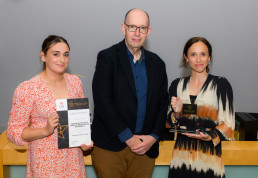Research and impact | By Shamim Quadir
An international collaboration investigating childbirth-related trauma across the world
How a study led by City academics will create a global databank to improve maternity care.
Being pregnant and having a baby is a time of huge physical, psychological and social change, and is therefore a period of rapid transition and adaptation. While the birth of a baby is viewed positively in most cultures, research suggests that between 20 and 40 per cent of women find childbirth traumatic and four per cent of women may develop post-traumatic stress disorder (PTSD) as a result.
Studying the impact of PTSD
Birth trauma and PTSD have a substantial impact on women and their families, with postpartum PTSD highly coincident with depression and fear of subsequent births, as well as reduced breastfeeding, poorer child development and strain on the couple’s relationship.
Launched in January 2021, the International Survey of Childbirth-Related Trauma (INTERSECT) study consists of over 18,000 women in more than 40 countries. It is an international collaboration between researchers located across the world, investigating childbirth-related PTSD, and with a particular emphasis on working with under-represented countries in South America, Asia and Africa.
Key aims of the study are to determine the prevalence of birth trauma and PTSD worldwide, examine cross-cultural differences in symptom presentation, and consider the causes of childbirth-related PTSD symptoms across countries and cultures.

Creating an international databank to inform policy
Anonymised data from each country will be linked to create an international databank of information on traumatic birth and PTSD. This databank will be available to researchers and policymakers across the world to increase knowledge on women and families’ experiences of birth to inform policy and improve maternity care. The databank will be completed in 2023, with the main results of the study expected to be reported in 2024/25.
Given the networking opportunities afforded by the collaborative work on INTERSECT, consortium members have been able to add studies to the survey, collectively named INTERSECTplus. These include studies of the impact of different maternity care systems on birth trauma, the impact on fathers, and the parent-baby bond, and encompass qualitative work, additional survey measures and systematic reviews, as well as many doctoral projects that the INTERSECT survey has been embedded into internationally.

INTERSECT is led by a team of researchers at City, University of London and the College of Tel Aviv-Yafo. Lead Investigator, Susan Ayers, is Professor of Maternal Health at the Centre for Maternal and Child Health Research at City. She said:
“Women and families’ experiences are at the heart of everything we do, and I am excited to be leading the INTERSECT project, which has the potential to really drive change to prevent birth trauma and make sure those affected get help and treatment.”
– Professor Susan Ayers, Lead Investigator
Susan added: “Results of INTERSECT and INTERSECTplus will increase understanding of birth trauma globally, including in countries where there is little awareness or understanding of birth trauma. It’s a fantastic collaborative effort and we are very grateful to all our INTERSECT partners, women and families across the world for working together to make this happen.”
INTERSECT is supported by City’s Global Challenges Research Funding provided by UK Research and Innovation (UKRI), The Policy Support Fund, provided by Research England, UKRI, and the Fondation Myriam de Senarclens 2022 Award for outstanding research in psychosomatic obstetrics and gynaecology.